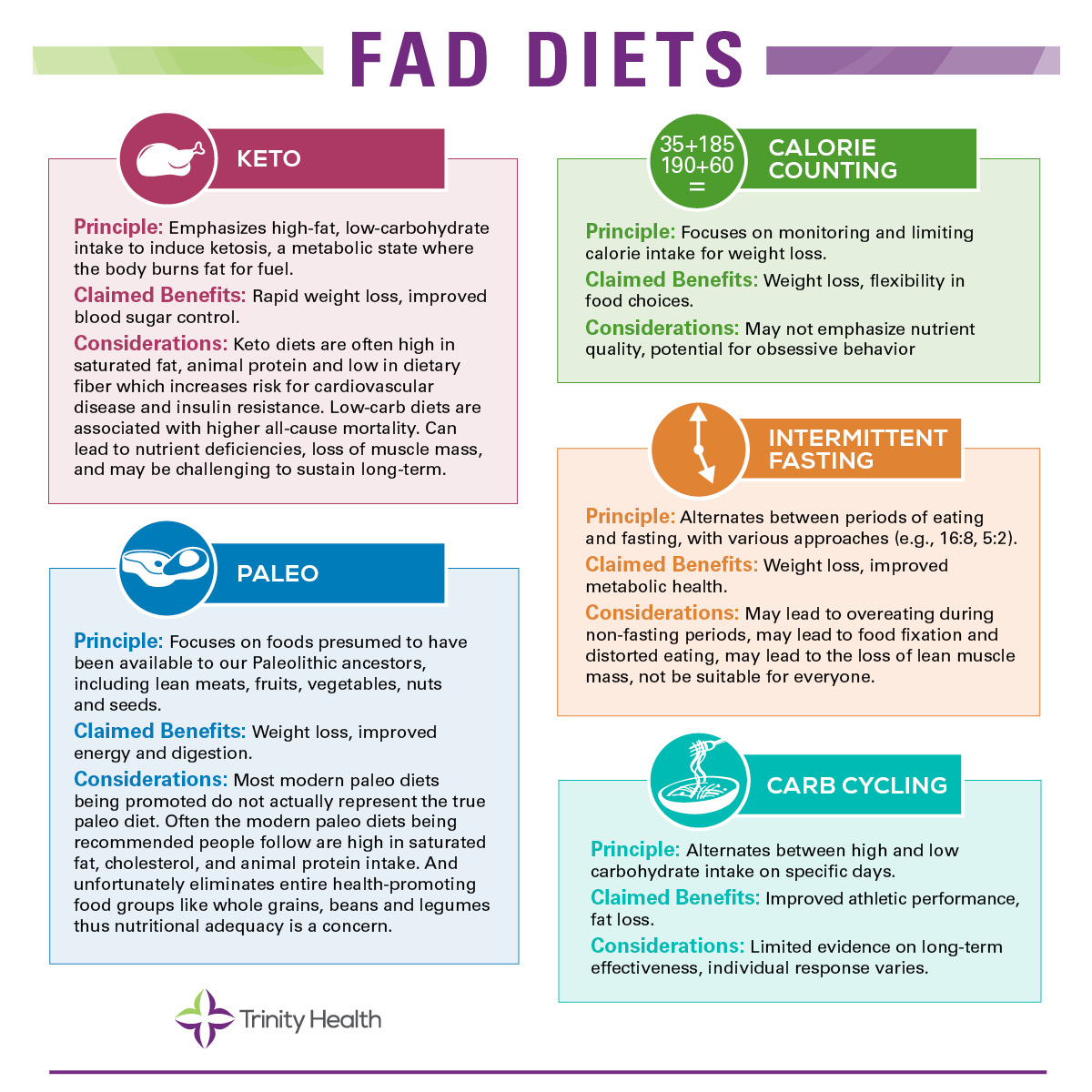The Reality of the Latest Fad Diets
January 7, 2024
Categories: Community Health, Health and Wellness, Men's Health, Women's Health
A new diet that gains popularity, promising a quick and easy way to lose weight is often called a “fad diet”. Some common fad diets or dietary restrictions are Keto, Paleo, calorie counting, intermittent fasting, and carb cycling - but not every diet trend is a good fit for your personal nutritional needs.
“We see a variety of diets people consider when they are trying to lose weight, anything from a very low carb eating pattern to all liquid diets. Many fad diets tend to take an extreme approach or tend to villainize one certain food group,” said Tara Couturier, Registered Dietitian Nutritionist for Trinity Health.
Fad diets often exhibit short-term effectiveness in achieving rapid weight loss, primarily through water weight reduction and muscle loss. Sometimes the short-term “gains” are often overshadowed by negative impacts on overall health. There are countless research articles on different diet patterns and their outcomes. A Consensus Report done on adults with diabetes and prediabetes investigated many different diets and found many were successful for weight loss, including low carbohydrate, vegan or vegetarian and low fat. The paleo diet provided mixed results with inconclusive evidence. There is still a lot of emerging research on intermittent fasting as well. (Evert et al., 2019)
It is important to remember that some of these diets may be able to be modified to fit a more sustainable approach. For example, a very low carbohydrate diet (defined by this study as when carbohydrates are reduced to less than 25% of a person’s calories) showed weight loss benefit. A low carbohydrate diet (defined as when carbohydrates are reduced to 26-45% of calories) was also shown to be effective for weight loss; this diet pattern may be more approachable for some people. It is important to remember your diet needs will change based on any present chronic illnesses or medical conditions.
"In general, we tend to discourage any diet that may be overly restrictive since sustainability is very important to consider when making lifestyle changes."
“Success depends on many different factors including time, resources, motivation, and others. Sometimes it may not be the diet itself helping or hindering the situation. In general, we tend to discourage any diet that may be overly restrictive since sustainability is very important to consider when making lifestyle changes,” said Tara Couturier, RDN.
These dietary changes, despite their potential pitfalls, often have an impact on eating behaviors. One positive aspect is the heightened awareness of food choices and meal preparation. Individuals following a specific diet tend to become more mindful of what they consume and where their food comes from. This often translates into changes in their food-related habits, such as a shift towards home-cooked meals and a more intentional grocery shopping approach.
"Try thinking of a few nutrients you could add to your diet instead of focusing so much on what to take out."
Try thinking of a few nutrients you could add to your diet instead of focusing so much on what to take out. For example, many of us do not get enough fiber daily. Consider adding a new vegetable to your grocery list for the week or adding some nuts and seeds to your morning yogurt. Think proactively, write out a few balanced meals for the week before you go to the store so you have a plan and can make smarter choices. When it comes to diet changes, for some people consistency can be more important than intensity.
The emphasis on quick fixes in fad diets can compromise overall balance in your diet. The exclusion of essential nutrients or food groups may result in nutrient deficiencies, negatively affecting various bodily functions. Inadequate intake of vitamins, minerals and macronutrients can lead to fatigue, weakened immune function and a slowed metabolism. This occurs as the body adapts to reduced calorie and energy intake by conserving energy, potentially hindering long-term weight loss efforts.
Cycling through various fad diets can also have significant psychological and emotional repercussions. “The constant pursuit of quick fixes and adherence to restrictive eating patterns often leads to a rollercoaster of emotions for individuals,” said Emily Haller, Lifestyle & Culinary Medicine Program Coordinator for Lifestyle Medicine.
Before embarking on a new diet trend or fad, it's crucial to approach it with a critical mindset. Consider the sustainability of the diet in the long term, focusing on whether it promotes a balanced and varied intake of nutrients. Additionally, seek guidance from a registered dietitian or healthcare professional to ensure that the chosen diet is safe and tailored to individual health needs. They may be able to help you modify that diet or eating plan to better fit into your daily life.
To avoid yo-yo dieting, avoid any diet you feel would be too difficult. If you feel apprehensive or dreadful when thinking about improving your eating, it may not be the diet for you. Remember that healthy and sustainable dietary habits are rooted in evidence-based practices, emphasizing a diverse and nutrient-rich intake for long-term well-being.
Sources: Evert, A. B., Dennison, M., Gardner, C. D., Garvey, W. T., Lau, K. H. K., MacLeod, J., Mitri, J., Pereira, R. F., Rawlings, K., Robinson, S., Saslow, L., Uelmen, S., Urbanski, P. B., & Yancy, W. S. (2019, May). Nutrition therapy for adults with diabetes or prediabetes: A consensus report. Diabetes care. https://www.ncbi.nlm.nih.gov/pmc/articles/PMC7011201/
Looking to start a new diet or thinking about weight loss?
Start with an appointment with your doctor to get started with a plan that’s right for you.





